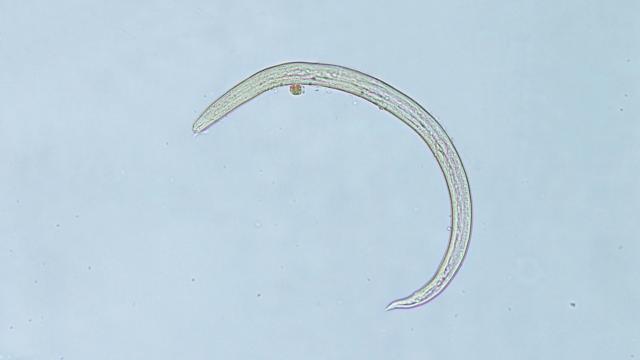A parasitic brain-infecting roundworm primarily spread by rats and snails is planting down roots in more parts of the U.S., research this week suggests. Scientists appear to have confirmed the presence of the parasite within local rodent populations in the state of Georgia. While human cases are considered rare, these worms can also infect and sicken many other animal hosts.
The parasite is known as the rat lungworm (Angiostrongylus cantonensis)—a name that alludes to its complicated life cycle. Adult worms live, mate, and lay eggs in the rat’s lungs. These eggs hatch into larvae, are coughed out into the rat’s throat, and then swallowed back in through the digestive tract, where they end up in poop. A snail or slug then comes along and either eats the contaminated poop or is in close enough contact that the worms burrow themselves into the animal. Once inside, the larvae grow further and enter their infectious stage of life.
Ideally (for the parasite, at least), another rat eats this infected snail, allowing the larvae to fully mature, head over to that rat’s lungs, and start the cycle again. But sometimes, a human or other animal eats the infected snail or is otherwise exposed to the larvae instead. When this happens in humans, the worms can invade our nervous system and brain, triggering an infection called eosinophilic meningitis. Fish, frogs, and crustaceans can also become less preferred but still viable hosts to the infectious larvae, providing another potential route of transmission to humans.
Most cases of human rat lungworm have been documented in Southeast Asia and the Pacific Islands, including Hawaii, where the worms are endemic. But in recent years, the worms have started to show up in other regions of the world, including Louisiana, Texas, and Florida in the U.S. And there’s now clear evidence that they’ve made themselves comfortable in Georgia as well, according to the authors of this new study, published earlier this month in the journal Emerging Infectious Diseases.
The researchers analyzed tissue samples collected from brown rats found dead around a local zoo in Atlanta between 2019 to 2022. About 20% of these rats were infected with rat lungworm, confirmed through genetic testing and physical examination. The genetic testing also revealed that the worms bore a close resemblance to worms found in Louisiana and other parts of the U.S. where they’ve recently been seen.
The findings, the authors say, “[suggest] that this zoonotic parasite was introduced to and has become established in a new area of the southeastern United States.” It’s also possible that the worms have been in Georgia even longer than known, given that other studies have found infected rats in the neighbouring states of Florida and Alabama prior to 2019.
Cases of human rat lungworm are rarely reported in the U.S., though it might be more common than currently thought. Most infections are mild and tend to not require treatment to clear up. However, a heavy infestation can cause permanent neurological damage and even death. The worms can also be dangerous to the surrounding wildlife that they infect.
All in all, the authors say, the existence of the worm in the populated Atlanta area poses “a possible threat to the health of humans and domestic, free-ranging, and captive animals.” More research should be done to better understand the worms’ potential for expanding further into the U.S., they add.
